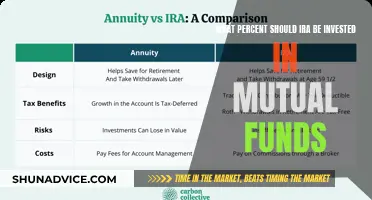
Health savings accounts (HSAs) are a great way to save for future medical expenses or boost your retirement funds. HSAs come with a triple tax benefit: tax-deductible contributions, tax-free growth, and tax-free withdrawals for qualified medical expenses. When choosing an investment fund for your HSA, consider your risk tolerance and future medical needs. If you're using your HSA primarily as a retirement account, opt for high-return investments. If you plan to regularly tap into your HSA, consider low-risk, low-return options like money market funds. To make the most of your HSA, try to invest as much as possible while maintaining enough cash to cover your medical expenses.
| Characteristics | Values |
|---|---|
| Tax advantages | Contributions are deductible; investment growth is tax-deferred; and withdrawals are tax-free for qualified medical expenses |
| Eligibility | Enrolled in a high-deductible health plan (HDHP); not enrolled in Medicare; not claimed as a dependent on someone else's tax return; no other health coverage |
| Annual deductible | $1,600 for self-only coverage; $3,200 for family coverage |
| Annual maximum for out-of-pocket expenses | $8,050 for self-only coverage; $16,100 for family coverage |
| Contribution limits | $4,150 for self-only coverage; $8,300 for family coverage; participants age 55+ are allowed an extra $1,000 as a catch-up contribution |
| Investment options | Exchange-traded funds (ETFs); mutual funds; individual stocks; money market funds; short-term bond funds; robo-advisors |
| Investment strategy | Consider risk tolerance, time horizon, and expected medical expenses; invest aggressively if using HSA mainly as a retirement account; consider a mix of high-return and low-risk options |
| Fees | Annual asset-based fees may apply; e.g. 0.10% for Choice, 0.25% for Select, and 0.35% for Managed options |
What You'll Learn

Understanding the tax benefits of an HSA
A Health Savings Account (HSA) offers a triple tax benefit, which makes it an attractive savings option. Here's how the tax benefits of an HSA work:
Tax-Free Contributions
Contributions to an HSA are tax-deductible, which means you can deduct them from your gross income, thus lowering your taxable income. If you make contributions through payroll deductions, taxes are not withheld, so every dollar you contribute goes directly into your account. This gives you more buying power when paying for qualified health expenses. Individuals can contribute up to $4,150 in 2024, while families can contribute up to $8,300. Those aged 55 and older can contribute an additional $1,000 as a catch-up contribution.
Tax-Free Growth
Any interest or earnings on your HSA account are tax-free as long as the money is used for qualified medical expenses. This means that the funds in your account grow without being subject to taxes. Utilizing the investing feature of your HSA can be an important component of your long-term financial plan, allowing you to grow your account over time.
Tax-Free Withdrawals
You can make tax-free withdrawals from your HSA to pay for qualified medical expenses. This is in contrast to other tax-advantaged accounts like 401(k)s or IRAs, where you pay taxes on withdrawals. Withdrawals from your HSA are 100% tax-free for eligible medical expenses such as deductibles, copays, prescriptions, vision, and dental care. Additionally, there is no "use-it-or-lose-it" rule with HSAs; the balance rolls over from year to year, giving you the flexibility to save and spend as needed.
The triple tax benefit of an HSA makes it a powerful tool for saving for future medical expenses or even boosting your retirement funds. Understanding and maximizing these tax benefits can help you make the most of your HSA and achieve your financial goals.
Alternative Investment Funds: Diversifying Your Portfolio
You may want to see also

HSA vs. IRA/401(k)
An HSA, or Health Savings Account, is a savings account designed for medical expenses. It is available to those with a high-deductible health insurance plan. HSAs come with a triple tax benefit: contributions are tax-deductible, any earnings remain tax-free as long as they are used for qualified medical expenses, and money can be withdrawn tax-free at any time to pay for these expenses.
A 401(k), on the other hand, is an employer-sponsored retirement account. Contributions to this account are typically made through payroll deductions and are often matched by the employer. The tax rules for 401(k) plans depend on whether the plan is traditional or Roth. With a traditional 401(k), you pay taxes on withdrawals during retirement, whereas with a Roth 401(k), you contribute money after taxes and withdrawals are tax-free.
An IRA, or Individual Retirement Account, is a long-term savings account that can be used to save for the future and offers certain tax advantages. You can invest in a range of financial products, including stocks, bonds, and mutual funds. IRAs are typically designed for self-employed individuals without access to employer-sponsored retirement plans.
Both HSAs and 401(k)s offer valuable tax advantages and can be used to supplement retirement savings. However, HSAs are specifically intended for medical savings and require a high-deductible health insurance plan. 401(k)s, on the other hand, are solely for retirement savings.
When deciding between an HSA and a 401(k), consider your current financial situation and goals. If you are looking for an account to cover medical expenses, an HSA is a better choice. If you want to save for retirement and have the freedom to transfer funds to an IRA later, a 401(k) is a better option. Additionally, if your employer matches contributions, it may be beneficial to prioritize contributing to that account first.
It is important to note that you can contribute to both an HSA and a 401(k) in the same year, and the right choice for you may vary depending on your circumstances.
Best Public Mutual Funds: Where to Invest Smartly
You may want to see also

Choosing between a robo-advisor or self-directed investing
When it comes to choosing between a robo-advisor and self-directed investing, there are several factors to consider. Both options have their own advantages and disadvantages, and the right choice depends on your personal preferences, financial goals, investment knowledge, and available time. Here's a more detailed look at the two options:
Robo-Advisor
Robo-advisors are digital investment platforms that use algorithms to manage and rebalance your portfolio automatically. They offer a hands-off, automated investing experience, making them ideal for beginners or those who prefer a more passive approach. With a robo-advisor, you simply set your financial goals and risk tolerance, and the platform handles the rest. This can save you a significant amount of time and effort, as you don't need to stay updated with market trends or analyse potential investments. Additionally, robo-advisors typically offer well-diversified portfolios based on proven strategies, taking the emotion out of trading.
However, one of the main drawbacks of robo-advisors is that they may limit your investment options, often investing in exchange-traded funds (ETFs) or index funds. They also come with their own set of fees, typically charging a small percentage of your invested assets, which can add up over time. While robo-advisor fees are generally lower than those of traditional human advisors, they can still impact your overall returns.
Self-Directed Investing
Self-directed investing, on the other hand, offers more control and flexibility over your investments. You choose your own investments based on your research and risk tolerance, allowing you to pursue your own investment strategies. This approach gives you access to a wider range of investments, including individual stocks, bonds, mutual funds, derivatives, and alternative assets. It can be exciting to have this level of autonomy over your financial future, and the potential for superior returns is higher.
However, self-directed investing requires a significant time investment and a solid understanding of financial markets. You need to stay updated with market trends, conduct research, and analyse potential investments. The responsibility of making investment decisions rests solely on you, which can be stressful, especially during volatile market conditions. Additionally, the risk of losing money due to poor investment decisions is higher with self-directed investing.
Making the Choice
The choice between a robo-advisor and self-directed investing depends on your specific circumstances and preferences. If you value control, have a good grasp of investing, and are willing to put in the time and effort, self-directed investing may be the right choice. On the other hand, if you prefer a more hands-off approach, don't have the time to actively manage your investments, or are just starting your investment journey, a robo-advisor could be a better option. It's important to consider your financial goals, risk tolerance, and investment style before making a decision.
Axis Small Cap Fund: Smart Investing Strategies for Beginners
You may want to see also

HSA investment options
A health savings account (HSA) is a great way to save for future medical expenses or boost your retirement funds. HSAs come with a triple tax benefit: tax-deductible contributions, tax-free growth, and tax-free withdrawals for qualified medical expenses.
When it comes to investing your HSA, there are a few options to consider. Firstly, determine your risk tolerance and future medical needs. If you have a low-risk tolerance or anticipate needing funds for medical expenses in the near future, consider low-risk, low-return options such as money market funds or short-term bond funds.
On the other hand, if you don't expect significant medical expenses soon, investing in stocks could be a good option. You can invest in individual stocks or opt for stock-based funds like index funds or dividend funds. Index funds offer a diversified group of stocks that track specific indexes, while dividend funds focus on companies that pay dividends, which are typically more established and safer.
Additionally, you can consider using a robo-advisor, which selects investments based on your risk tolerance and time horizon. These usually come with lower fees than traditional financial advisors.
- Vanguard Total Stock Market Index Fund Admiral Shares (VTSAX)
- Vanguard Wellington Fund Investor Shares (VWELX)
- Fidelity 500 Index Fund (FXAIX)
- Schwab Target 2050 Index Fund (SWYMX)
- Schwab Value Advantage Money Fund - Investor Shares (SWVXX)
- Fidelity Short-Term Bond Fund (FSHBX)
Remember to consider your personal circumstances and consult a qualified professional before making any investment decisions.
First-Time Funds: Why You Should Invest Now
You may want to see also

HSA investment strategies
Overview
Health Savings Accounts (HSAs) are a great way to save for future medical expenses or boost your retirement funds. HSAs offer a triple tax benefit: tax-deductible contributions, tax-free earnings (as long as they're used for qualified medical expenses), and tax-free withdrawals.
When it comes to investing your HSA, there are a few things to keep in mind. Firstly, check with your HSA administrator if there's a minimum balance required before you can invest. Secondly, consider your risk tolerance and future medical needs to determine your investment strategy. Here are some specific investment options and strategies to consider:
Investment Options
- Money market funds: These are low-risk, low-return options, suitable if you keep a small balance in your HSA or plan to use it regularly.
- Stocks: A good option if you don't expect high medical expenses in the near future. Individual stocks are the riskiest approach, while index funds and dividend funds are more diversified and therefore safer.
- Mutual funds: These can be actively managed by a professional or self-managed. They may include stocks, bonds, ETFs, and more.
- Robo-advisors: Some HSA providers offer robo-advisors that select investments on your behalf based on your risk tolerance and time horizon.
Investment Strategies
- Take advantage of employer matching contributions to maximize your funds for qualified medical expenses and free up money for investments.
- Contribute the maximum amount allowed to your HSA to make the most of this tax-advantaged account.
- Consider your time horizon: If you're decades away from retirement, consider more aggressive investments like mutual funds, ETFs, or stocks. If retirement is just around the corner, opt for less volatile choices like bonds and dividend stocks.
- Think of your HSA as part of your overall retirement strategy and ensure it provides diversification to your portfolio.
- Avoid withdrawing funds from your HSA whenever possible to maximize its growth over time.
Remember, investing in HSA funds may not be suitable for everyone, especially those with high medical expenses or those who prefer different investment options. It's important to carefully consider your personal circumstances and consult with a qualified professional before making any investment decisions.
Unlocking Sector Funds: A Smart Investment Strategy
You may want to see also
Frequently asked questions
A health savings account (HSA) is available if you have a high-deductible health insurance plan. It helps pay for out-of-pocket medical expenses. In 2024, the minimum deductible for an HDHP is $1,600 for an individual and $3,200 for a family.
HSAs come with a triple tax benefit: contributions are tax-deductible, earnings remain tax-free as long as they're used for qualified medical expenses, and money can be withdrawn tax-free at any time to pay for these expenses.
This will depend on your unique circumstances. Understanding your risk tolerance and potential future medical needs will help determine how aggressively to invest your savings. For example, if you're using an HSA mainly as a retirement account, then it could make sense to opt for high-return investments.
Vanguard Total Stock Market Index Fund Admiral Shares (VTSAX), Vanguard Wellington Fund Investor Shares (VWELX), Fidelity 500 Index Fund (FXAIX), and Schwab Target 2050 Index Fund (SWYMX) are some good options.







